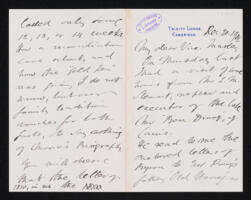Upper Brook Street. Forwards an issue of a [philosophy] magazine, is missing issues of July and August 1811.
Queen's Square Place, Westminster. Expresses concern for the health of the inhabitants of the [London] timber docks including Earl Spencer's property
Unable to dine
Trinity Lodge, Cambridge.—Encloses six letters (2–7) written by Lord Byron to Henry Drury, which have been bequeathed to the college by the son of the recipient.
—————
Transcript
Trinity Lodge, Cambridge
Dec. 20. 1902
My dear Vice-Master,
On Thursday last {1} I had a visit of some hours from Mr L. M. Stewart, nephew and executor of the late Mr “Ben Drury,” of Caius {2}.
He read to me the enclosed letters of Byron to Mr Drury’s father, “Old Harry” as he was called at Harrow, a Son of Dr Joseph Drury the Head Master.
He left out one sentence in one letter about the Turks, which he told me was disgusting {3}, and I have not seen it.
The letters date between 1807 {4}, when the Hours of Idleness were published, and 1815 soon after Byron’s Marriage.
As there are numerous references to my Father, it may be well just to point out that my Father succeeded Dr Drury at Easter, 1805, and that Byron left the School that summer, i.e. I suppose, at the end of July. Consequently, their relation as Master and Pupil lasted only some 12, 13, or 14 weeks. How a reconciliation came about, and how the “gold pen” was given, I do not know, but our family tradition vouches for both facts, to say nothing of Moore’s Biography.
You will observe that the letter of 1810, in wh. the {5} reference to the “gold pen” occurs, describes the famous swim from Sestos to Abydos, and adds—what I had either not known or forgotten—that the swimmer had made a previous attempt which failed.
May I ask you and Dr Sinker kindly to take Charge of the letters, which Mr Benjamin Drury bequeathed to our Library, and to consider where and in what form they may best be kept. The fact that they are a bequest should be specially recorded.
Perhaps it might also be recorded that Dr Joseph Drury, the Grandfather of the Testator, was himself a Trinity man. His Son, “Old Harry,” to whom Byron wrote the letters, was at Eton and King’s.
I am, my dear Vice-Master,
Most truly yours
H. Montagu Butler
—————
2 folded sheets.
{1} The 18th.
{2} Benjamin Drury’s sister Emily (1813–1902) married Stewart’s father, Lestock Wilson Stewart (1824–1876), an army doctor, in India in 1852.
{3} See the letter of 3 May 1810 (R.2.40A/4). Stewart may well have omitted more than one sentence.
{4} The earliest of the letters (R.2.40A/2) in fact dates from 13 January 1808, but it was misdated 1807.
{5} ‘1810’ struck through.
Transcript
Grand Hôtel des Bergues, Genève
3. Jan 1898.
Dear Mrs. Eddington,
I sent you just one bit of my ideas abt. Stanley as soon as he left us. The rest must follow now.
His presence has been a great pleasure to us. You have got a boy mixed of most kindly elements, as perhaps Shakspeare might say {1}. His rapidly and clearly working mind has not in the least spoiled his character. I don’t know when I have had to do with so modest and gentlemanly a boy. It is a testimony to day schools and home training, (not, I am afraid, my favourite theory.)
His youth has, of course, been just a little against his making friends, but has not been fatal to it. In Clayton, & in Wood & Brown he has nice associates; but he seems more contented alone than most boys are.
His work is all that I expected, & more: & I feel altogether that he is “a precious youth” committed to my charge. I can realise to some extent what Margaret would feel like if she were left alone to bring up our own little Richard.
I remain
Your friend sincerely
John W. Graham
—————
The writing-paper is engraved with illustrations of the hotel, etc. The year is wrong, as Eddington did not enter Owen’s College till October 1898 (see his Notebook).
{1} Graham evidently had in mind Antony’s encomium on Brutus at the end of Julius Caesar: ‘His life was gentle, and the elements | So mix’d in him that Nature might stand up | And say to all the world “This was a man!”’
Office of the Minister of Defence.—Is glad that Pethick-Lawrence was able to attend yesterday’s Indian independence celebrations.
Swansea - GA will be 'extremely glad' to have Neale as a pupil. However, further to his correspondence with Myers, he does not know whether Mr Hare had or had not already engaged a tutor for Neale. Could WW answer some questions further to the fellowship examination - 'In the first place must I sit at all? In the next place supposing that I sit, by what time must I be at Cambridge?'"
Asks him to see Mr Wellsteed, his attorney
Offers to commend him to Roederer, Talleyrand, Gaudin and LeBrun, offers words of caution
Thanks her for her for letter, informs her that Mr Fox's health improving
Discusses terms on which Mr Garnier will surrender his patent, crisis within the government:
Discusses the affair of Lord Colchester, speaker of the House of Commons
Paris. Discusses his emigration to the United States of America
Pleased to hear of the progress made by TM's pupils, sees a new era of education ahead, government becoming liberals, differences with Maculloch and Mill





























